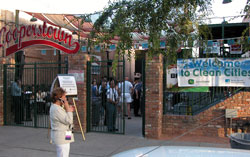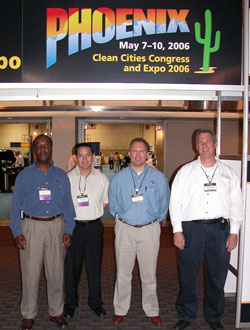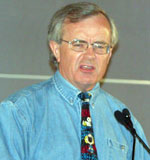 The Clean Cities Congress crowd kind of changed the slogan for Alice Cooper’s Town a little last night to “Where Rock and Alternative Fuels Meet.”
The Clean Cities Congress crowd kind of changed the slogan for Alice Cooper’s Town a little last night to “Where Rock and Alternative Fuels Meet.”
The band, Still Cruisin, had the crowd on the dance floor to some great rock and roll.
Just to give you a taste here’s a short video clip:  Still Cruisin (WMV file)
Still Cruisin (WMV file)
Domestic Fuel coverage of the Clean Cities Congress is made possible by the following sponsors:




 The band at our closing reception was Still Cruisin led by founder and drummer Bill Ball.
The band at our closing reception was Still Cruisin led by founder and drummer Bill Ball.
 The closing reception was held last night at
The closing reception was held last night at  On my way out of the convention center yesterday I stopped by the Ride & Drive and found myself in a
On my way out of the convention center yesterday I stopped by the Ride & Drive and found myself in a  At the end of the day today participants here at the Clean Cities Congress could ride and drive a variety of alt fuel vehicles.
At the end of the day today participants here at the Clean Cities Congress could ride and drive a variety of alt fuel vehicles. Our sponsor for coverage of the Clean Cities Congress is
Our sponsor for coverage of the Clean Cities Congress is  Annabel Cook, Honda, pictured here with Ed Huestis,
Annabel Cook, Honda, pictured here with Ed Huestis,  Giving us a light-hearted look at alternative fuels as only he can, Jim Kenzie, Chief Auto Reviewer for the
Giving us a light-hearted look at alternative fuels as only he can, Jim Kenzie, Chief Auto Reviewer for the 
 A Florida-based company is working to make ethanol from pineapples. Biomass Resources Corporation of Boca Raton reportedly has “achieved initial success at extracting Ethanol from pineapple fruit and pineapple plant waste,” according to a
A Florida-based company is working to make ethanol from pineapples. Biomass Resources Corporation of Boca Raton reportedly has “achieved initial success at extracting Ethanol from pineapple fruit and pineapple plant waste,” according to a  It is day three of the Clean Cities Conference in Phoenix, and the convention center is packed with conference goers, all here for the same cause. With dozens of sessions, exhibits, ceremonies and receptions, people attending the conference are promised hours of information and entertainment. The crowds of people filling the convention center cannot be filed into one specific stereotype, as business people, hippies, yuppies, truckers and more can be seen in all directions. This just goes to show that the topic of alternative fuels is one which appeals to many different demographics.
It is day three of the Clean Cities Conference in Phoenix, and the convention center is packed with conference goers, all here for the same cause. With dozens of sessions, exhibits, ceremonies and receptions, people attending the conference are promised hours of information and entertainment. The crowds of people filling the convention center cannot be filed into one specific stereotype, as business people, hippies, yuppies, truckers and more can be seen in all directions. This just goes to show that the topic of alternative fuels is one which appeals to many different demographics.